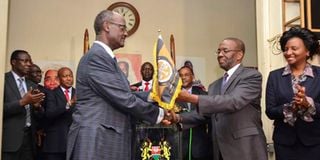Mutunga’s speeches and the vision of an accountable, citizen-centred Judiciary

Retired Chief Justice Willy Mutunga hands over the Judiciary flag to Supreme Court Judge Ibrahim Mohammed on June 16, 2016.
What you need to know:
- Dr Mutunga inaugurated his tenure as Kenya’s most criticised, most debated and most analysed judicial officer.
- Advocates were thrilled by Mutunga’s innovative leveraging of civic architecture.
On June 20, 2011, Dr Willy Mutunga was sworn in as the first Chief Justice under the Constitution of Kenya 2010. This event was greatly anticipated and keenly followed throughout the country, not only because of our habitual ceremonialism and the notorious Kenyan custom of converting the most frivolous VIP functions into extravaganzas at once solemn and tawdry.
As his entire career had proved, Mutunga was here to shock us out of our somnolent inertia, upset a licentious status quo, and transgress passionately cherished yet profoundly useless, even inimical norms. He stood on the steps of the Supreme Court building and delivered his first speech, directly addressed to the people of Kenya, devoid of the turgid platitudes and leaden protocols associated with seminal governmental events.
On that stunningly anti-normal note, Mutunga inaugurated his tenure as Kenya’s most criticised, most debated and most analysed judicial officer, defining his assignment, the values he envisaged to characterise a new judiciary, and the underlying philosophy of judiciary transformation.
Speech writers are invested in the context of public addresses and interested in their content. Advocates were thrilled by Mutunga’s innovative leveraging of civic architecture; his preference for the front steps of the judiciary’s signature building to the forbidding wood-panelled ceremonial chambers or courtrooms within.
To governance and policy commentators, it was exciting to see how resolutely ostensive behaviour of leaders signals transformative intent and mobilises collective action with far-reaching institutional implications.
So obviously, I was quite beside myself in this moment.
‘Home-coming’ fete
Mutunga comfortably bore the immensity of his assignment, as a trustee of the dreams of those whose quest to open the doors of access to justice had cost them inordinately, and as the steward of a nation’s collective aspiration “to put tyranny, oppression and exploitation, opacity and impunity on the back foot, while making strides towards freedom, opportunity, and transparency and liberty”.
On June 16, 2016, his last day in office, Chief Justice Mutunga addressed the nation once again from the front steps of the Supreme court building.
This time round, he was able to proudly cite significant victories scored in his pioneering, colossally symbolic tour of duty.
There was no triumphant bluster or boastful hyperbole, only a matter-of-fact statement that he had led a collective enterprise that had “done well” in “laying the foundations for the transformation of the judiciary.”
By this time, Mutunga had normalised his transgressive assaults on the redundant pretensions and hollow affectations of our VIP culture. Almost unwittingly, we had stampeded through the gap opened by his example to breathe the intoxicating air of freedom and escape the timid, self-questioning, morally conflicted, cognitively dissonant deference to illegitimate authority.
Mutunga hosted his ‘home-coming’ fete in Nairobi’s Korogocho slums, not his birthplace of Kitui, underscoring his devout disenchantment with our “vernacular elite, which purveys a vernacular politics, completely unable to comprehend the challenges and demands of civic duty, other than through the prism of native lenses”.
This poor quality of our elite, Mutunga argues, explained the crisis of governance and development in our country. Because the elite cannot internalise their long-term interest in “progressive politics and inclusive development” and “embrace civic, rather than native politics”, Kenya wallows in poverty and remains “trapped in the tragedy of underdevelopment of both our economy and democracy”.
Prodigious mind
This and more than 100 other events during Mutunga’s tenure offer insights into the philosophy of a unique Kenyan leader, a platonic philosopher king whose radical intellect is grounded in moral commitment to the transformation of public institutions into instruments of hope, compassion, dignity, justice and happiness for ordinary people.
Three brilliant editors, Sylvia Kang’ara, Duncan Okello and Kwamchetsi Makokha have thoughtfully selected more than 60 speeches, seven opinion and three scholarly articles to give a glimpse of the breadth and depth of Mutunga’s rigorous and prodigious mind.
In curating this diverse material by broad thematic areas, the editors implicitly delineate the contours of overarching disciplinary interconnectedness among diverse elements of a distinctive Mutungan revolutionary institutional paradigm: scholarship, leadership and advocacy.
The result of the trio’s effort is a work titled Beacons of Judiciary Transformation, permeated by Mutunga’s devotion to the sovereignty of the people and the place of accountability in honouring it.
Transformation through “reimagination of a new institution” and “significant internal reorganisation” finally delivered a public-facing and citizen-centred judiciary. In his words, the institution became “more sensitive, accountable and service-oriented”.
Certainly, a far cry from the hide-bound institution suffocating in tradition, whose credibility was so dismal and in which public confidence was so abysmal, Kenyans once went to war with each other rather than challenge presidential election results before the courts.
This work was launched yesterday at an event graced by Hon. Mohamed Chande Othman, Tanzania’s Chief Justice. It is published by Sheria Publishing House.
The writer is an advocate of the High Court and a former State House speech writer. @EricNgeno





